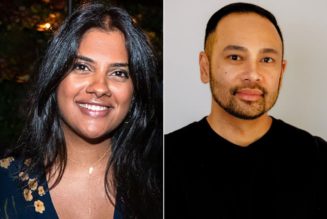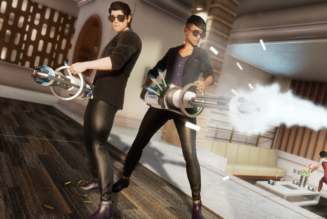
As a band that helped inspire and define the 21st century indie music boom, Animal Collective has certainly earned the right to rest on its laurels. But listening to their new studio album, Time Skiffs, it’s obvious the group’s drive to play around in that bottomless sandbox of 12 notes remains as strong as ever. A frisky, adventurous nine-song set, Time Skiffs is Animal Collective at its exuberant best. You can feel the joy of discovery as Panda Bear (Noah Lennox), Avey Tare (David Portner), Geologist (Brian Weitz) and Deakin (Josh Dibb) explore ideas across bright, quirky soundscapes that are a delight to dip your toes into.
Speaking to Billboard from his newly built home studio in Lisbon, Portugal, Lennox says supply chain issues delayed the completion of his personal studio space, but advance planning tempered his expectations for releasing a new album in the midst of an industry-wide vinyl manufacturing backup. “The label knew it would take x amount of months more than it usually does, so the period from when we handed it in to when it’s coming out was super long, mainly because of issues like that,” he says. “It was baked into the release plan.”
That pandemic-related production delay is part of the reason that Time Skiffs arrives six years after the last proper Animal Collective studio album, Painting With. But it’s also the first Animal Collective studio album in a decade (since Centipede Hz) to feature all four members of the group. “We’re lucky enough to dabble in various things, but the thing we hadn’t done in a while was a traditional studio recording — a full group album thing,” Lennox says. Considering the flood of Animal Collective material – EPs, visual album, soundtracks, tours, a live recording in the Amazon rainforest and more – during that time period, it’s hardly a reunion album. Even so, Time Skiffs is imbued with the elation of four long-time friends enjoying a warm weekend getaway after spending far too much time apart.
Here’s what Lennox had to say about his drum techniques on the new album, the songs they shelved for later and why Animal Collective doesn’t often share the meaning behind their songs – even with each other.
The band recorded Time Skiffs album during the pandemic, but when did work on it begin?
It was right before. We had scheduled time with an engineer and were looking at studios. We were planning on recording in March (2020) but then of course the pandemic hit. Then it was a matter of, are we able to do this? And if so, how?
So everyone had to do there parts at home, remotely?
All done at home and separate. The initial songwriting started quite a bit ago. The rest of the guys, I think I was on tour, the other three guys did this show in New Orleans at a place called the Music Box Village. They just released a video of it recently. A bunch of the songs on Time Skiffs they wrote for that performance. I don’t want to speak for them but I feel like designing those songs for that space, we took that aesthetic and energy and that’s the foundation for Time Skiffs. It helped that we’d gotten together after that New Orleans thing; there was even a little tour we did on the west coast playing a bunch of these songs. So maybe half of the songs we knew the arrangements and how we were going to play them. Without that, I don’t know how we would’ve got it done. The fact that we’d done quite a bit of work before the pandemic hit helped us out a lot.
[embedded content]
It’s increasingly normal for bands to record remotely even without a pandemic. Did it open your eyes to those possibilities, or was being in a studio together sorely missed?
More the latter. Even though I feel it was successful how we did it, it just would have been more fun. Getting together to record and tour is the only time I get to see these guys, so there’s just the social aspect of it. Which is a really important part of the whole deal – human interaction. It makes its way into the music. I feel if there was no pandemic we would have done the more traditional route. But like everyone else these days, we’re just trying to do the best we can and get through it.
Was there anything that just didn’t come together?
There’s another group of songs we saved for later – those were the songs we felt relied more on the performance dynamic. These were the songs we felt we could get going (remotely). A couple songs didn’t make it that ultimately we left off the record because we felt we didn’t totally nail. We’ll definitely get (those) done very soon. I don’t want to say when but there will definitely be recordings of those songs at some point.
One of the album’s advance songs, “Prester John,” is actually two songs melded together. What was it that made you feel they worked better as one?
It’s a couple things. One, I feel like the first part of the song wanted something else at the end, but we weren’t sure what. We’d been working on it because at first it was a standalone piece but didn’t feel totally there yet. The connection there was more melodic than anything else, although I haven’t talked much to Dave about what his half of the song really means. There’s certainly melodic and harmonic symmetry there. I think it was Dave who (noticed) the last chord of this could go right into “Prester.” They’d been playing that second half “Prester” for a while, my part of it was the newer piece.
[embedded content]
I know it’s not your song, but do you know why Prester John, an apocryphal Christian king from centuries ago, inspired this song?
I don’t. Seems like you’d expect a band to be talking about what the song means but we’re pretty guarded about that. I don’t know for what reason. Occasionally one of us will be like, “that’s a cool lyric, what were you thinking there?” I guess we’re trying to be respectful of each other. I don’t know what his Prester John thing is to be honest.
What about your part? What inspired that?
[It was] when the first climate change report came out. I didn’t want to write a climate change song, it felt sort of not right to me, but the feeling I had when I first saw that, there was a profound sadness that I hadn’t really… it’s hard to articulate. I felt like starting from that point could make a good song. There’s a feeling of we’re not doing it right or we’ve spoiled the chance, something like that. It was the genesis of it. It’s a bit nostalgic for maybe a more carefree time. I’m reluctant to bring the climate change argument into it just because there’s a lot to say there and a lot to talk about that the song certainly doesn’t address. It’s way more abstract than that. It was inspired by a feeling I got thinking about that stuff. It’s a little down in the dumps but I’d like to think there’s always a grain of hope in our stuff.
Pandemic wise, how are you occupying your time? What activities give you comfort?
Just working, really, is the most effective way of me not thinking of all the spiraling outside. Just trying to keep working and keep focused. My family keeps me pretty busy. A lot of collaborations and odds and ends; anything that will give me something to occupy my mind, I’ll do it.
What about the title, Time Skiffs — where does that come from?
It came from conversations we were having about how music can be this transportive thing, almost a form of time travel. The analogy was the songs as little vessels or boats that allow you to travel through time. And it just has a nice sound to it. Those two combined are what make a good title to me: something that reads cool and sounds cool but also has some sort of meaning. Which can be tough for us because we don’t often discuss what the songs mean, so trying to come up with an overarching metaphor or symbology for the thing can be complex. Which perhaps is why we’ve had some titles that are pretty broad.
The last few Animal Collective releases – the Tangerine Reef visual album, the Meeting of the Waters EP – didn’t involve you. Does it feel strange listening to new Animal Collective music you’re not involved in?
It’s not. We all had creative identities before we were in a band together, and we would give each other tapes of our music when we were super young, so there was always a separate but together feeling to us. In the early days especially we felt it would always be different formations of us, different people would collaborate together, and [Animal Collective] would be this patchwork quilt. And for a while there in the middle it got away from that and became band/album, band/album. These days it feels like a bit back to that early ideal of a complex web of stuff we get into. That feels cool and I like that.
And everything bleeds into everything else, at least for me. When I’m doing the solo stuff, if we get together after that, there’s residue from the thing before that manages to make its way into the new thing. It’s maybe a bit harder to trace this time around going from [my solo album] Buoys into Time Skiffs, but mostly because the Buoys stuff is all digital drum machine stuff and a lot of sub bass and there’s none of that on the Time Skiffs thing. But the way I approached the drums was trying to sound more like a drum machine, really trying to find the right feel. Less concerned with the pattern and more with the right feel for every song. More of a focus on technique. I studied the drums in a more traditional way, like if you went to a teacher. Even as far as the kick pedal I played with my foot flat instead of up. Everything about the tone of the drums I was way more focused on than I’d ever been before.
[embedded content]
Was it refreshing to go back to live drums after using drum machines?
For sure, that’s my favorite thing about the drums is the physical aspect of it, and the response you get from doing it. I was really into sports when I was young, so it’s kind of a combination of two of my favorite things, which is music and sports. That’s my attraction to the drums over other musical stuff, the juice you get from working out. I don’t know if I play it in a particularly muscular way, but it feels good.
Are you anxious to get back on the road with the band?
Doing those couple of shows (in late 2021) felt really good. It’s been such a consistent part of my life for so long that not being able to do it starts to feel funny after a while. Getting back on the bike, so to speak, felt good. And for audiences, too. It’s this reminder of the old times. Playing the shows feels like a little piece of the old times.
[flexi-common-toolbar] [flexi-form class=”flexi_form_style” title=”Submit to Flexi” name=”my_form” ajax=”true”][flexi-form-tag type=”post_title” class=”fl-input” title=”Title” value=”” required=”true”][flexi-form-tag type=”category” title=”Select category”][flexi-form-tag type=”tag” title=”Insert tag”][flexi-form-tag type=”article” class=”fl-textarea” title=”Description” ][flexi-form-tag type=”file” title=”Select file” required=”true”][flexi-form-tag type=”submit” name=”submit” value=”Submit Now”] [/flexi-form]










Tagged: entertainment blog, Indie, music, music blog, Rock